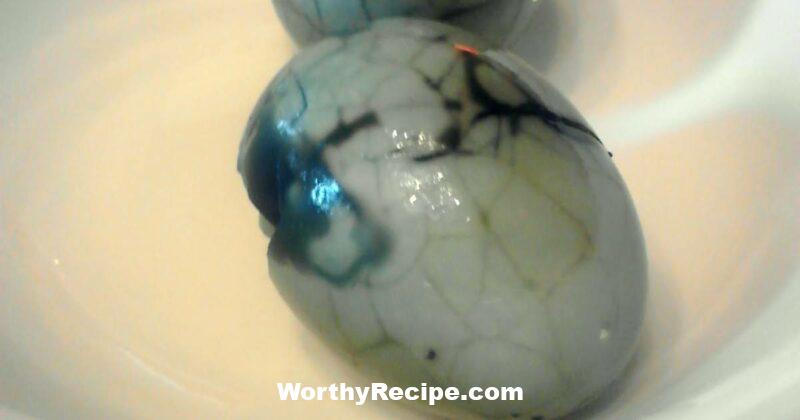What Does a Boiled Rotten Egg Look Like?
Boiled eggs are a common breakfast food item around the world. Some people prefer their boiled eggs soft-boiled, while others prefer them hard-boiled. Boiling an egg is a simple cooking technique that requires only water and some patience. But what happens when the egg goes bad? What does a boiled rotten egg look like, and how can you identify it?
Introduction
A boiled rotten egg is an egg that has gone bad and has been boiled. Eggs can go bad due to bacterial growth, time and temperature exposure, or improper storage. Boiling eggs is a common cooking technique that enables the easy peeling and eating of an egg within minutes of boiling it. However, if the egg is already spoiled before boiling it, it can be dangerous to consume because it may contain harmful bacteria.
The importance of identifying a rotten boiled egg cannot be overstated. Eating a rotten boiled egg can lead to severe food poisoning, which can cause vomiting, diarrhea, stomach cramps, and dehydration. In this article, we will dive deep into the signs of a rotten boiled egg, causes for eggs going bad, best practices in boiling and storing eggs, food safety concerns with rotten eggs, safe ways to dispose of them.
Signs of a Rotten Boiled Egg
The following are signs that your boiled egg may have gone bad:
- Appearance: When cut open inside the shell after cooking the egg white is discolored and sometimes even slimy-looking rather than white.
- Smell: Spoiled eggs have a strong odor that you cannot miss.
- Yolk smells different: The yolk of a fresh egg smells somewhat sulphuric whereas the bad egg has a stronger, more pungent odour.
- Texture: A slimy texture is another indication of spoiled eggs.
- Floats in water: This is another indication of a bad egg. A fresh egg sinks in water while a spoiled one floats.
A boiled rotten egg is also easily identified by its grey or green ring around the yolk, caused by iron and sulfur compounds reacting due to high temperatures and hydrogen ions produced by bacteria. This discoloration normally arises after boiling eggs for over 10 minutes or leaving hard-cooked eggs at room temperature for too long before using or refrigerating them.
Causes of Rotten Eggs
The following are some common causes of eggs going bad:
- Bacterial Growth: Bacteria growth is the most common cause of eggs going bad. Salmonella, staphylococcus, or other harmful bacteria can grow on an egg’s shell when it’s unwashed and create cracks in it allowing the bacteria to penetrate over time.
- Time and Temperature: Eggs that are not stored properly, especially at room temperature, will go bad after they have been sitting out too long. The USDA and FDA recommend refrigerating eggs within two hours of being laid to slow down bacterial growth.
- Refrigeration Storage Issues: Refrigerator temperatures must be strictly maintained at or below 40°F to prevent many types of bacteria from multiplying, leading to spoilage.
Boiling & Storing Eggs
Here are the best practices in boiling and storing eggs:
- Boiling Eggs: Start by putting your eggs in a single layer of cold water. Bring the water to a rolling boil, then turn off the heat and cover with a lid. Let your eggs stay covered for between 2-12 minutes depending on how you like them boiled. For firm yolks and whites, boil for at least 8 minutes. Then move the eggs immediately to an ice bath to cool off as this helps prevent overcooking, removes excess shell, and helps loosen up shell that may still be tough to peel.
- Storing Boiled Eggs: Store boiled eggs in the refrigerator within two hours of cooking them for safety reasons. Refrigerated boiled eggs in their shells can last up to a week, while already peeled cooked eggs should not be stored for more than 2-3 days.
- Avoid boiling rotten eggs: Check the freshness of your raw eggs before cooking them by dropping them into a glass of water. The freshest ones sink to the bottom, but if any begin to float, discard those as they have gone bad already.
Food Safety Concerns with Rotten Eggs
Eating rotten or spoiled eggs poses significant foodborne illness risks since potentially harmful microorganisms can live inside contaminated eggs. Most common illnesses associated with eating rotten eggs include salmonella infections, typhoid fever, gastroenteritis, and botulism poisoning.
Various symptoms of foodborne sickness caused by eating rotten or contaminated eggs include diarrhea, vomiting, stomach cramps or pain, feverish disorders like headache or weakness, and chest pain or difficulty breathing for some severe cases. Special populations such as young children, elderly individuals, pregnant women or individuals with a weakened immune system may exhibit more severe symptoms or more extended illnesses from ingesting them.
How to Dispose of Rotten Eggs
If you discover rotten boiled eggs in your house, take these steps to dispose of them safely:
- Throw them away: Wrap the rotten eggs in plastic wrap, which will keep bacteria inside and prevent their shells from coming into contact with your garbage can. Discard them in a closed trash bin.
- Cook outside: If you do not want to throw the eggs away, you can safely use them for outdoor composting purposes or garden fertilization.
Conclusion
In conclusion, identifying rotten boiled eggs is essential for food safety reasons. The signs of a rotten boiled egg include smell, texture, appearance of slime or discoloration and floatability. Rotting eggs occur through temperature and time exposure, poor refrigeration storage conditions and bacterial growth. Therefore, always store your boiled eggs properly after cooking them. Food safety concerns with rotten eggs are real because they can trigger foodborne illnesses leading to some severe symptoms and prolonged sicknesses even death as well for some extreme cases. So don’t hesitate to discard any boiled egg that shows signs of spoilage and dispose of it properly.
Frequently Asked Questions
What is a boiled rotten egg?
A boiled rotten egg is an egg that has been overcooked, leading to a green or gray ring around the yolk. The egg may also emit a sulfurous odor.
What causes eggs to become rotten?
Eggs become rotten due to bacterial growth. As the bacteria break down the egg, they create a gas that can cause the egg to float in water.
How can you tell if an egg is boied and rotten?
You can tell if an egg is boiled and rotten by its smell and appearance. A boiled rotten egg will have a strong, sulfurous odor and a discolored yolk. The white of the egg may also take on a rubbery texture.
Are boiled rotten eggs safe to eat?
Boiled rotten eggs are not recommended for consumption due to the risk of food poisoning from bacterial growth. It’s best to discard any eggs that have a strong odor or unusual appearance.






